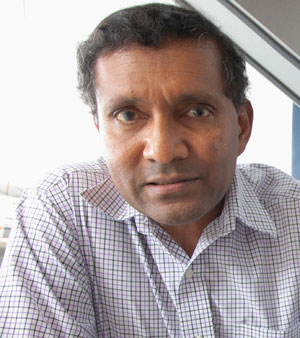Grant Funds Cell-Measurement Technology
|
Engineering professor and Calit2 academic affiliate Kumar Wickramasinghe knows a thing or two about creating innovative laboratory tools. After all, he developed the vibrating mode atomic force microscope, as well as a variety of probes and tips, used in labs around the world to exam nanostructures too small to be seen with optical microscopes.
Wickramasinghe now is crafting another tool – one he hopes will have an even bigger impact – thanks to a prestigious $1 million grant from the W.M. Keck Foundation.
His goal: to create a nanoprobe for live cell genomics: a desktop instrument that can analyze cells, modify their genetic makeup, study their chemistry in real time and quantify their behaviors without destroying the samples.
“These technologies don’t exist right now,” he says.
Wickramasinghe believes the user-friendly tool will enhance understanding of cell function, leading to improved disease diagnosis, treatment and even prevention.
“The ability to detect low-level fluctuations in gene expression in living cells – down to single molecules - is key to detecting genetic mutations that result in diseases and for studying the effects of drugs or signaling molecules,” he says.
“There’s a whole field of systems biology focused on understanding all these things but they don’t have the tools.”
The Henry Samueli Endowed Chair and National Academy of Engineering member is collaborating on the project with UCI developmental and cell biologists Kavita Arora and Rahul Warrior, as well as with oncologist and hematologist Dr. Edward Nelson. Input from biologists is critical, he says. “I need to understand from a user point of view what they need. I want to make this tool user-friendly so it seamlessly integrates into all their other measurement techniques.”
Wickramasinghe intends to have a prototype ready by the end of the three-year grant.
“I am very excited about this,” he enthuses. “The Keck Foundation seeks out research that will change the way people do things and they’re very focused on instrumentation. So it fits perfectly into what I am doing.
“I am very grateful to Keck for identifying the importance of this.”
-- Anna Lynn Spitzer

